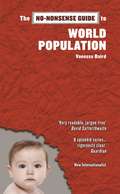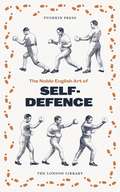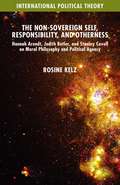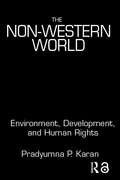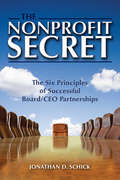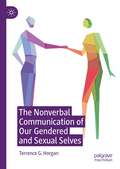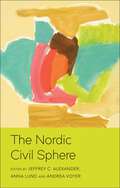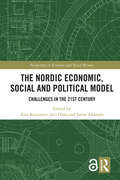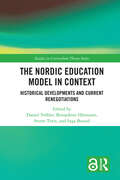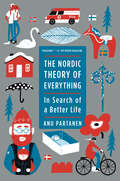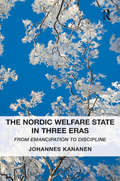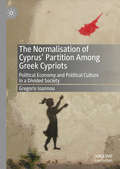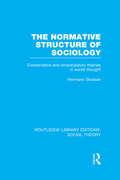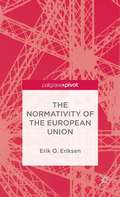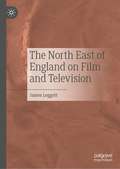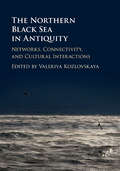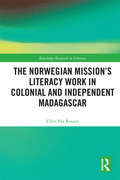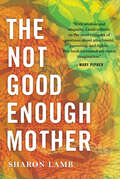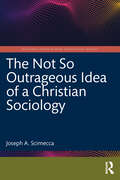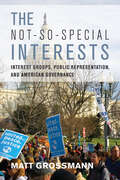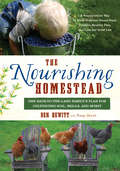- Table View
- List View
The No-Nonsense Guide to Religion
by Symon HillReligion is a term that is often used in the media and public life without any clarification. However, it is a word that encompasses hundreds of different beliefs. It is a loaded word that has a different meaning for every person; religion can be seen as a source of war and peace, love and hate, dialogue and narrow-mindedness.Symon Hill's No-Nonsense Guide to Religion tries to explain what religion means, how we relate to it, how it was created, and how it affects us culturally, politically, and spiritually today.Drawing on a wide range of sources, The No-Nonsense Guide to Religion does not just concentrate on the popular and well-established traditions, which normally over-emphasize powerful figures. The guide also focuses on the diversity within religions as well as the similarities between them.The globalization of communications has made more people aware of religious conversion, with more people than ever before belonging to a different religious community from their parents. The No-Nonsense Guide to Religion considers how religion has shaped our culture as well as how our culture is shaping religion today.Symon Hill is a tutor in practical theology, a writer, a trainer, and an activist. He has written comment pieces for newspapers ranging from the Sunday Herald to The Daily Mail and contributes regularly to the Guardian's website, The Friend, and Ekklesia.
The No-Nonsense Guide to World Population
by Vanessa BairdNo-Nonsense Guide to World Population (1/2 page) With world population passing seven billion and predicted to hit nine billion by 2050, we are in the grip of a number panic. This book explodes some of the common myths, looks at what the numbers really mean, and addresses nine topics, such as why women in most parts of the world have fewer children, what will happen to our societies as we all live longer, and how having babies relates to climate change. Vanessa Baird is co-editor at New Internationalist magazine. Her previous books include The No-Nonsense Guide to Sexual Diversity and, as compiler and editor, Eye to Eye Women.
The Noble English Art of Self-Defence
by Ned DonnellyA book of boxing by one of the nineteenth-century stars, celebrating the 175th anniversary of The London Library.Ned Donnelly, a former prize fighter turned boxing instructor and author (with a lot of help from his literate friends), was a household name as a one of the most successful, famous, and respected instructors in the history of British boxing. This delightful book - more than an instruction manual, more than an amusing pastime - captures the fighting style from a crucial moment in boxing history right after the Prize Ring had become extinct. With a detailed clarity of expression, and accompanied by charming illustrations of a slightly paunchy boxer, it is a fascinating insight to the man who trained George Bernard Shaw.The books in "Found on the Shelves" have been chosen to give a fascinating insight into the treasures that can be found while browsing in The London Library. Now celebrating its 175th anniversary, with over seventeen miles of shelving and more than a million books, The London Library has become an unrivalled archive of the modes, manners and thoughts of each generation which has helped to form it.From essays on dieting in the 1860s to instructions for gentlewomen on trout-fishing, from advice on the ill health caused by the "modern" craze of bicycling to travelogues from Norway, they are as readable and relevant today as they were more than a century ago.
The Non-Sovereign Self, Responsibility, and Otherness: Hannah Arendt, Judith Butler, and Stanley Cavell on Moral Philosophy and Political Agency (International Political Theory)
by Rosine KelzDrawing on Hannah Arendt, Judith Butler and Stanley Cavell, this book addresses contemporary theoretical and political debates in a broader comparative perspective and rearticulates the relationship between ethics and politics by highlighting those who are currently excluded from our notions of political community.
The Non-Western World: Environment, Development and Human Rights
by Pradyumna P. KaranThrough a cross-cultural and multi-disciplinary approach, this introductory textbook focuses on critical issues of development, environment, and cultural conflicts facing most area of the non-Western world. Areas covered include China, Japan, Southeast Asia, the Indian subcontinent, the Middle East, and sub-Saharan Africa.
The Nonprofit Secret: The Six Principles of Successful Board/CEO Partnerships (The\nonprofit Secret Ser.)
by Jonathan D. SchickA nonprofit leadership consultant offers a blueprint for success in this guide to healthy governance and executive communication.All nonprofit organizations start with a noble mission, but good intentions alone are no guarantee of success. All too often, nonprofit boards are hampered by political and functional challenges that negatively impact operations. Conflicts between the board and the CEO can greatly inhibit effectiveness despite everyone’s devotion to the same set of goals.Jonathan D. Schick has spent years working with nonprofits of all sizes, helping each one achieve maximum impact by addressing the vitally important partnership at its heart. In this groundbreaking book, Schick shares the Six Principles that can unlock an organization’s potential and lead to successful board/CEO partnerships.
The Nonverbal Communication of Our Gendered and Sexual Selves
by Terrence G. HorganThis book provides a comprehensive guide to the latest research on the nonverbal cues that signal our biological sex, gender, and sexual orientation to others, as well as our sexual/romantic interest in others. Crucially, it is a volume which incorporates critical perspectives which help to tackle the short-comings associated with the predominant focus on cis-gender, heterosexual individuals . It underscores how specific cues work in conjunction with other cues during the communication of our gendered and sexual selves, and how various factors (cultural, contextual, social, personality variables) impact that process. It also addresses common misconceptions including the notion that the romantic landscape has become more sexualized and predominantly technology driven. This book highlights that we still tend to communicate a romantic interest in each other in quite traditional places, such as school, home, and social events, using tried-and-true nonverbal cues, like gazing and smiling. Across six chapters readers will learn about the cues to our gendered and sexual selves, which exist in our facial and bodily movements, dress, personal artifacts, gestures, body odor, vocal characteristics, touch, and posture, amongst others. This engaging work presents historical and contemporary research findings that will appeal to students and scholars of nonverbal communication, communication studies, the psychology of gender, and sexuality studies.
The Nordic Civil Sphere
by Jeffrey C. Alexander Anna Lund Andrea VoyerThe civil sphere is a distinctively democratic field in modern societies, one that sustains universalizing cultural aspirations and organizational structures and that has tense and uncertain boundaries with other spheres of social life, like the economy, religion, family, and state. Unlike the latter, which are more particularistic and hierarchical in character, the civil sphere defines itself in terms of solidarity – the feeling of being connected with every other person in the collectivity. The utopian ideals of democratic solidarity shape every modern society, even if they are often compromised by the messy realities of social life. This volume uses the theory of the civil sphere to shed new light on Nordic societies, while at the same time drawing on the distinctive experiences of the Nordic nations to reflect on and advance the theory of the civil sphere. Nordic societies have long been admired for creating a distinctive form of social democracy, but this admirable achievement has not been well conceptualized theoretically. Most attempts to explain Nordic social democracy focus on material and organizational factors. This volume, by contrast, emphasizes the cultural foundations and characteristics of social democracy, demonstrating how civil sensibilities are necessary for the creation of an egalitarian and democratic state. Nordic civil spheres, however, are not only pro-civil but also white in color, European in ethnicity, secular in character and gender-equal in a subtly restrictive manner. Such primordialization of state civility is vividly on display in the sometime tense relationships that develop among natives and “foreigners” in Nordic countries, relationships that expose the primordial undersides of the social democratic codes and civil values that constitute the Nordic civil sphere. A major contribution to the theory of the civil sphere and to our understanding of the cultural and normative underpinnings of social and political life, this volume will be of particular interest to students and scholars of sociology and politics.
The Nordic Economic, Social and Political Model: Challenges in the 21st Century (Perspectives in Economic and Social History)
by Anu Koivunen; Jari Ojala; Janne HolménThe Nordic Model is the 20th-century Scandinavian recipe for combining stable democracies, individual freedom, economic growth and comprehensive systems for social security. But what happens when Sweden and Finland – two countries topping global indexes for competitiveness, productivity, growth, quality of life, prosperity, and equality – start doubting themselves and their future? Is the Nordic Model at a crossroads? Historically, consensus, continuity, social cohesion, and broad social trust have been hailed as key components for the success and for the self-images of Sweden and Finland. In the contemporary, however, political debates in both countries are increasingly focused on risks, threats, and worry. Social disintegration, political polarization, geopolitical anxieties, and threat of terrorism are often dominant themes. This book focuses on what appears to be a paradox: countries with low income differences, high faith in social institutions, and relatively high cultural homogeneity becoming fixated on the fear of polarization, disintegration, and diminished social trust. Unpacking the presentist discourse of "worry" and a sense of interregnum at the face of geopolitical tensions, digitalization, and globalization, as well as challenges to democracy, the chapters take steps back in time and explore the current conjecture through the eyes of historians and social scientists, addressing key aspects of and challenges to both the contemporary and future Nordic Model. In addition, the functioning and efficacy of the participatory democracy and current protocols of decision-making are debated. This work is essential reading for students and scholars of the welfare state, social reforms, and populism, as well as Nordic and Scandinavian studies.
The Nordic Education Model in Context: Historical Developments and Current Renegotiations (Studies in Curriculum Theory Series)
by Daniel Tröhler Bernadette Hörmann Sverre Tveit Inga BostadTracing historical and cultural factors which gave rise to the Nordic Education Model, this volume explores why Northern European education policy has become an international benchmark for schooling. The text explains the historical connection between a Nordic ideal of democracy and schooling, and indicates how values of equality, welfare, justice, and individualism might be successfully integrated in national school systems and curricula around the world. The volume also highlights recent debates around the longevity of the Nordic model and explores the risks and challenges posed by international policy and assessment agendas. Exploring how Nordic education polices successfully merge social equity with academic excellence, the book combines cultural, historical, sociological and philosophical analysis with a deep exploration of curriculum and teaching. This book will be of great interest to researchers, scholars, and postgraduates working across the fields of curriculum, comparative education, cultural studies and history and philosophy of education and education policy.
The Nordic Model and Physical Culture (Routledge Research in Sport, Culture and Society)
by Richard Giulianotti Mikkel Bjørset Tin Frode Telseth Jan Ove TangenThis book examines the relationships between the Nordic social democratic welfare system (‘The Nordic Model’) and physical culture, across the domains of sport, education, and public space. Presenting important new empirical research, it helps us to understand how the paradoxical blend of social democracy and liberalism in the Nordic countries influences physical culture, which in turn contributes to a quality of life that ranks highest in the world. Drawing on perspectives from sociology, cultural studies, history, education, political science, outdoor studies, and urban studies, the book explores topics such as dance education for sport students, doping in cross-country skiing, outdoor education, the active body, and the ideology of public parks. It includes research material from across the region, including Norway, Sweden, Iceland, Finland, and Denmark. This is fascinating reading for anyone with an interest in physical culture, sport studies, leisure studies, or outdoor studies, as well as sociologists or political scientists with an interest in Nordic politics, culture, and society.
The Nordic Theory of Everything: In Search of a Better Life
by Anu PartanenA Finnish journalist, now a naturalized American citizen, asks Americans to draw on elements of the Nordic way of life to nurture a fairer, happier, more secure, and less stressful society for themselves and their children.Moving to America in 2008, Finnish journalist Anu Partanen quickly went from confident, successful professional to wary, self-doubting mess. She found that navigating the basics of everyday life--from buying a cell phone and filing taxes to education and childcare--was much more complicated and stressful than anything she encountered in her homeland. At first, she attributed her crippling anxiety to the difficulty of adapting to a freewheeling new culture. But as she got to know Americans better, she discovered they shared her deep apprehension. To understand why life is so different in the U.S. and Finland, Partanen began to look closely at both.In The Nordic Theory of Everything, Partanen compares and contrasts life in the United States with life in the Nordic region, focusing on four key relationships--parents and children, men and women, employees and employers, and government and citizens. She debunks criticism that Nordic countries are socialist "nanny states," revealing instead that it is we Americans who are far more enmeshed in unhealthy dependencies than we realize. As Partanen explains step by step, the Nordic approach allows citizens to enjoy more individual freedom and independence than we do.Partanen wants to open Americans' eyes to how much better things can be--to show her beloved new country what it can learn from her homeland to reinvigorate and fulfill the promise of the American dream--to provide the opportunity to live a healthy, safe, economically secure, upwardly mobile life for everyone. Offering insights, advice, and solutions, The Nordic Theory of Everything makes a convincing argument that we can rebuild our society, rekindle our optimism, and restore true freedom to our relationships and lives.
The Nordic Welfare State in Three Eras: From Emancipation to Discipline
by Johannes KananenNordic welfare states are known for a unique combination of equity and efficiency and for political institutions facilitating compromise and consensus between conflicting interests. The Nordic Welfare State in Three Eras: From Emancipation to Discipline analyses the historical and contemporary evolution of Nordic welfare states in Denmark, Sweden and Finland during three periods: the developmental period until the end of WWII, the period of emancipatory welfare institutions until the 1980s, and the period of restructuring from the 1980s until present times. The three eras discussed are shared in one way or another by all welfare states. However, Nordic welfare institutions are unique in the sense that they were particularly compatible with the ideas of Keynesian macro-economic management that constituted the blueprint of international economic ideas during the post-war period. This ground-breaking book will show how preceding emancipating elements of Nordic welfare states were largely lost in the process of renegotiating the post-war social order, and replaced by new elements of discipline and control.
The Normalisation of Cyprus’ Partition Among Greek Cypriots: Political Economy and Political Culture in a Divided Society
by Gregoris IoannouThis book explores the basic dynamics that shaped the Cyprus problem, with a focus on recent decades. The author deals with the periods, nodal points and fields that produced the conditions for the normalisation of partition and also presents the Cyprus problem as viewed from the outside. The chapters approach Cyprus’ division in light of power relations in society, the interaction between the political elite and society, and discuss the political and ideological dynamics as manifested in the public sphere. While analysing primarily the Greek Cypriot community, the book also refers to parallel developments in the Turkish Cypriot and international communities, arguing that the normalisation of Cyprus’ partition is rooted in the political economy and political culture of Greek Cypriots. At the same time, from the perspective of the peace and reunification movement, this is an inherently contradictory and potentially unstable process that can be overturned.‘Α remarkably thorough study focusing on nationalist narratives, political and media discourses and socio-economic structures in Cyprus and their impact on the formation and transformation of political identities since the 1950s. Unlike many other books on the issue, Ioannou analyses social and political developments in both the Greek-Cypriot and the Turkish-Cypriot communities. This approach sheds light on the internal reasons of the perpetuation of the island’s division, which the geopolitical and international relations approaches alone miss to grasp. Combining the analytical skills of a political scientist and his personal experience as an engaged citizen in favour of unification, Ioannou offers significant insight on a complex and traumatic conflict that remains one of Europe’s black spots.’ –Athena Skoulariki, Assistant Professor in Sociology of Communication, Discourse Analysis and Social Representations, University of Crete, Greece ‘The basic argument of the book is that the consolidation of partition was neither automatic nor happened behind the backs of Greek Cypriots. The very interesting and demythologising work of Gregoris Ioannou brings to light a hidden, but common secret of the Greek Cypriots.’ –Alexis Heraklides, Emeritus Professor of International Relations, Panteion University, Greece ‘Ioannou projects a multi-focal spotlight on the Cyprus problem, so as, at least for the careful reader, this becomes not only an interesting topic in itself, but, also a cognitive springboard from which to understand broader pathogenies of our common social and political life.’ –Seraphim Seferiades, Associate Professor in Political Science, Panteion University, Greece
The Normative Structure of Sociology: Conservative and Emancipatory Themes in Social Thought (Routledge Library Editions: Social Theory)
by Hermann StrasserIn this provocative analysis of the central issues and developments in modern social theory, Dr Strasser contends that enquiry into the function, tasks and mission of sociology as a discipline can be understood only in relation to the subject's historical development. He believes that a discussion of the origin and intention of sociology, particularly in relation to the established social order, enables us to grasp fully the nature of sociological theory, both past and present. He maintains that a sociologist's own position in society, and consequently his views on its development and his way of expressing those views, will affect the theoretical position he takes up.
The Normativity of the European Union
by Erik O. EriksenThis book provides an account of what has made European integration possible. Reconstructing the integration process up to the Eurozone crisis, Eriksen provides novel insight into the conditions for integration and the nature of the EU as well as highlighting why European solidarity has become a moral duty.
The North East of England on Film and Television
by James LeggottThis book analyses the representation of North-East England in film and television. It is a response to the way a number of important British films and programmes—for example, Get Carter (1971), Whatever Happened to the Likely Lads (1973-74), Our Friends in the North (1996) and Billy Elliot (2000)—have used this particular setting to explore questions of class, identity and history. It argues for the significance and coherence of a North-East corpus of film and television through a series of case studies relating to specific eras or types of representation. These include regional writers working for television in the 1970s, the achievements of the workshop movement in the 1980s and works produced within the genres of documentary, crime drama, comedy, period drama and reality television. The book discusses how the communities and landscapes of the region have been used to explore processes of cultural change, and legacies of de-industrialisation.
The Northern Black Sea in Antiquity: Networks, Connectivity, and Cultural Interactions
by Valeriya KozlovskayaThe Northern Black Sea region, despite its distance from the centers of classical civilizations, played an integral role in the socioeconomic life of the ancient Greco-Roman world. The chapters in this book, written by experts on the region, explore topics such as the trade, religion, political culture, art and architecture, and the local non-Greek populations, from the foundation of the first Greek colonies on the North Pontic shores at the end of the seventh and sixth century BCE through the first centuries of the Roman imperial period. This volume closely examines relevant categories of archaeological material, including amphorae, architectural remains, funerary and dedicatory monuments, inscriptions, and burial complexes. Geographically, it encompasses the coastal territories of modern Russia and Ukraine. The Northern Black Sea in Antiquity embraces an inclusive and comparative approach while discussing new archaeological evidence, offering fresh insights into familiar questions, and presenting original interpretations of well-known artifacts.
The Norwegian Mission’s Literacy Work in Colonial and Independent Madagascar (Routledge Research in Literacy #11)
by Ellen Vea RosnesOffering an original historical perspective on literacy work in Africa, this book examines the role of the Norwegian Lutheran mission in Madagascar and sheds light on the motivations that drove colonizing powers’ literacy work. Focusing on both colonial and independent Madagascar, Rosnes examines how literacy practices were facilitated through mission schools and the impact on the reading and writing skills to Malagasy children and youth. Analysing how literacy work influenced identity formation and power relations in the Malagasy society, the author offers new insights into the field of language and education in Africa.
The Not Good Enough Mother
by Sharon LambA psychologist who evaluates the fitness of parents when their children have been removed from their custody finds herself reassessing her own mothering when her son falls victim to the opioid crisis.Psychologist and expert witness Dr. Sharon Lamb evaluates parents, particularly in high-stakes cases concerning the termination of parental rights. The conclusions she reaches can mean that some children are returned home from foster homes. Others are freed for adoption. Well-trained, Lamb generally can decide what's in the best interests of the child. But when her son's struggle with opioid addiction comes to light, she starts to doubt her right to make judgments about other mothers.As an expert, a professor, and a mother, Lamb gives voice to the near impossible standards demanded by a society prone to blame mothers when anything befalls their children. She describes vividly the plight of individual parents, mothers in particular, struggling with addiction and mental illness and trying to make stable homes for their kids amid the economic and emotional turmoil of their lives--all in the context of the opioid epidemic that has ravaged her home state of Vermont. In her office, during visits with their children, and in the family court, the parents we meet wait anxiously for Lamb's verdict: Have they turned their lives around under child welfare's watchful eye? Do they understand their children's needs? In short, are they good enough? But what is good enough? Lamb turns that question on herself in the midst of her gradual realization of her son's opioid addiction. Amazed at her own denial, feeling powerless to help him, Lamb confronts the heartache she can bring into the lives of others and her power to tear families apart.
The Not So Outrageous Idea of a Christian Sociology (Routledge Studies in Social and Political Thought)
by Joseph A. ScimeccaThis book provides a rationale for a Christian sociology, challenging the materialist epistemology of contemporary sociology, which provides only a limited understanding of social behavior. Developing a history of the origins of sociology that recognizes the centrality of Christianity to the discipline’s development, it considers the secularization thesis and questions surrounding positivism, scientism and postmodernism, as well as engaging with the work of a range of figures including Margaret Archer, Robert Bellah, Peter Berger, Hans Joas, Thomas Luckmann, David Martin, and Christian Smith. A critique of modern sociology, which argues that a Christian approach provides a better explanation than contemporary paradigms of the polarization occurring today in American society, The Not So Outrageous Idea of a Christian Sociology will appeal to scholars and students with interests in sociological theory, research methods and epistemology, and the sociology of religion.
The Not-So-Special Interests: Interest Groups, Public Representation, and American Governance
by Matt Grossmann"Lobbyist" tends to be used as a dirty word in politics. Indeed, during the 2008 presidential primary campaign, Hillary Clinton was derided for even suggesting that some lobbyists represent "real Americans. " But although many popular commentators position interest groups as representatives of special-not "public"-interests, much organized advocacy is designed to advance public interests and ideas. Advocacy organizations-more than 1,600 of them-are now an important component of national political institutions. This book uses original data to explain why certain public groups, such as Jews, lawyers, and gun-owners, develop substantially more representation than others, and why certain organizations become the presumed spokespersons for these groups in government and media. In contrast to established theory and conventional wisdom, this book demonstrates that groups of all sizes and types generate advocates to speak on their behalf, though with varying levels of success. Matt Grossmann finds that the advantages of organized representation accrue to those public groups that are the most politically motivated and involved in their communities. Organizations that mobilize members and create a long-lasting presence in Washington become, in the minds of policymakers and reporters, the taken-for-granted surrogates for these public groups. In the face of perennial debates about the relative power of the people and the special interests, Grossmann offers an informed and nuanced view of the role of organizations in public representation and American governance.
The Nourishing Homestead
by Ben Hewitt Penny HewittA practiculture way to grow nutrient-dense food, produce healthy fats, and live the good life The Nourishing Homestead tells the story of how we can create truly satisfying, permanent, nourished relationships to the land, nature, and one another. The Hewitts offer practical ways to grow nutrient-dense food on a small plot of land, and think about your farm, homestead, or home as an ecosystem. Much of what the Hewitts have come to understand and embrace about their lives of deep nourishment is informed by their particular piece of land and local community in northern Vermont, but what they have gleaned is readily transferable to any place--whether you live on 4 acres, 40 acres, or in a 400-square-foot studio apartment. Ben and Penny (and their two sons) maintain copious gardens, dozens of fruit and nut trees and other perennial plantings, as well as a pick-your-own blueberry patch. In addition to these cultivated food crops, they also forage for wild edibles, process their own meat, make their own butter, and ferment, dry, and can their own vegetables. Their focus is to produce nutrient-dense foods from vibrant, mineralized soils for themselves and their immediate community. They are also committed to sharing the traditional skills that support their family, helping them be self-sufficient and thrive in these uncertain times. Much of what the Hewitts are attempting on their homestead is to close the gaps that economic separation has created in our health, spirit, and skills. Ben uses the term "practiculture" to describe his family's work with the land--a term that encompasses the many practical life skills and philosophies they embody to create a thriving homestead, including raw-milk production, soil remediation, wildcrafting, Weston A. Price principles, bionutrient-dense farming, permaculture, agroforestry, traditional Vermont hill farming, and more. The Nourishing Homestead also includes information on deep nutrition, the importance of good fats, and integrating children into the work of a homestead. The Hewitts' story is reminiscent of The Good Life, by Helen and Scott Nearing, and is sure to inspire a new generation of homesteaders, or anyone seeking a simpler way of life and a deeper connection to the world.
The Nova Scotia Home for Colored Children: The Hurt, the Hope, and the Healing
by Wanda Taylor“A history and a testimonial towards healing” of the hundreds of African-Nova Scotian orphans who suffered abuse and neglect at the government’s hands (The Coast).In 1921, prominent lawyer and Nova Scotia Black leader James R. Johnston’s vision of a place welcoming of Black children came to reality. In an era of segregation and overt racism that saw most orphanages refuse to take in Black children, the Nova Scotia Home for Colored Children fulfilled an important role.But despite its good intentions, today the Home is mostly known for a troubling past. Former residents launched a class action lawsuit alleging sexual and physical abuse suffered at the Home over a period of several decades. In The Nova Scotia Home for Colored Children: The Hurt, The Hope, and The Healing, author Wanda Taylor interviews former residents participating in the lawsuit and upcoming public inquiry and connects their stories to her own relationship with the Home. The former residents in this book provide an unsettling, and sometimes graphic, description of what life was like inside the Home and describe the many ways the government system designed to protect them instead exacerbated a culture of abuse and neglect.

